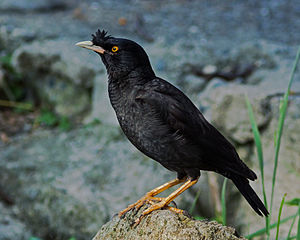Kresta akridotero
 Kresta akridotero
 | ||||||||||||||
| Biologia klasado | ||||||||||||||
| ||||||||||||||
| Acridotheres cristatellus (Linnaeus, 1766) | ||||||||||||||
| Konserva statuso | ||||||||||||||
Aliaj Vikimediaj projektoj
| ||||||||||||||
La Kresta akridotero aŭ Krestominao (Acridotheres cristatellus) estas specio de sturno de la familio de Sturnedoj kaj genro de Akridoteroj kiuj portas fruntajn krestojn.
Disvastiĝo
[redakti | redakti fonton]Ĝi estas indiĝena de sudorienta Ĉinio kaj Hindoĉinio. Ĉirkaŭ 1890, la Krestominao estis enmetita en Vankuvero regiono de Brita Kolumbio. Ĝi estis dekomence sukcesa, kaj atingis populacion centan, sen disvastiĝo for el Vankuvera kontinentaĵo. Meze de la 1902-aj jaro malpliiĝis kaj nun la birdospecio formortis el Nordameriko, sed ekzistas en Sudameriko (Argentino).
Aspelto
[redakti | redakti fonton]Malkiel aliaj similaj minaoj, ties beko estas pli blankeca ol flavoranĝa kun iom da rozkoloreco ĉebaze de suba makzelo. Same kiel la Granda akridotero temas pri tre nigra birdo kun tre fortikaj beko kaj flavoranĝaj kruroj. Rimarkinda karaktero estas kresto de plumoj kiuj malkombiĝas el la frunto, sed ne tiom unuopaj kaj izolitaj kiom ĉe la Granda akridotero, sed pli mallongaj kaj densaj. Ankaŭ la plumoj de la kapovertico kaj gorĝareo iom malkombiĝas. Krome estas blankaj flugilmakuloj kaj vostobordoj. La irisoj estas pli helaj ol ĉe la Granda akridotero, pli flavoranĝaj ol brunaj.
Referencoj
[redakti | redakti fonton]- IUCN2006, BirdLife International, 2004, 51920, Acridotheres cristatellus, 12a Majo 2006: Malplej zorgiga.
Plie
[redakti | redakti fonton]Libro
[redakti | redakti fonton]- Johnson, S. R., and R. W. Campbell. 1995. Crested Myna (Acridotheres cristatellus). In The Birds of North America, No. 157 (A. Poole and F. Gill, eds.). The Academy of Natural Sciences, Philadelphia, PA, and The American Ornithologists’ Union, Washington, D.C.
Tezo
[redakti | redakti fonton]- Tunhikorn S. Ph.D. (1989). Resource partitioning of four sympatric mynas and starlings (Sturnidae) in Thailand. Oregon State University, United States—Oregon.
Artikoloj
[redakti | redakti fonton]- Banks RC, Cicero C, Dunn JL, Kratter AW, Rasmussen PC, Remsen JV, Jr., Rising JD & Stotz DF. (2005). Forty-sixth supplement to the American ornithologists' union check-list of North American Birds. Auk. vol 122, no 3. p. 1026-1031.
- Gregory-Smith R. (1997). Pale-bellied Myna Acridotheres cinereus in Sarawak. Malayan Nature Journal. vol 50, no 4. p. 355-356.
- Hsieh YC, Chen SH, Wang CW, Lee YF, Chung WC, Tsai MC, Chang TC, Lien YY & Tsai SS. (2005). Unusual pox lesions found in Chinese jungle mynahs (Acridotheres cristatellus). Avian Pathology. vol 34, no 5. p. 415-417.
- Johnson SR & Campbell RW. (1995). Crested Myna Acridotheres cristatellus. Birds of North America. vol 0, no 157. p. 1-12.
- Montalti D & Kopij G. (2001). Bird community of inner La Plata City, Argentina. Acta Ornithologica. vol 36, no 2. p. 161-164.
- Navas JR. (2002). Introduced and naturalized exotic birds in Argentina. Revista del Museo Argentino de Ciencias Naturales Nueva Serie. vol 4, no 2. p. 191-202.
- Nguyenclausen A. (1975). PREENING BEHAVIOR OF GROUP OF MYNA BIRDS, ACRIDOTHERES-CRISTATELLUS(GM). Behaviour. vol 53, p. 91-108.
- Pranty B. (2001). The use of Christmas Bird Count data to monitor populations of exotic birds. American Birds. vol 102, p. 24-28.
- Schmidt RE. (1983). Hyper Mature Cataract in a Crested Myna Leucopsar-Rothschildi. Journal of Wildlife Diseases. vol 19, no 2. p. 158-159.
- Tang Z-Z & Tang C-T. (1993). Studies on the life cycle of Brachylaima mesostoma (Rud., 1803) Baer, 1933 (Trematoda: Brachylaimidae). Acta Zoologica Sinica. vol 39, no 1. p. 13-18.
- Wang Y-P, Chen S-h & Ding P. (2003). Breeding birds and their nests in street tree strips in Hangzhou city. Zoological Research. p. 2003.
| ||||||||||||||||||




